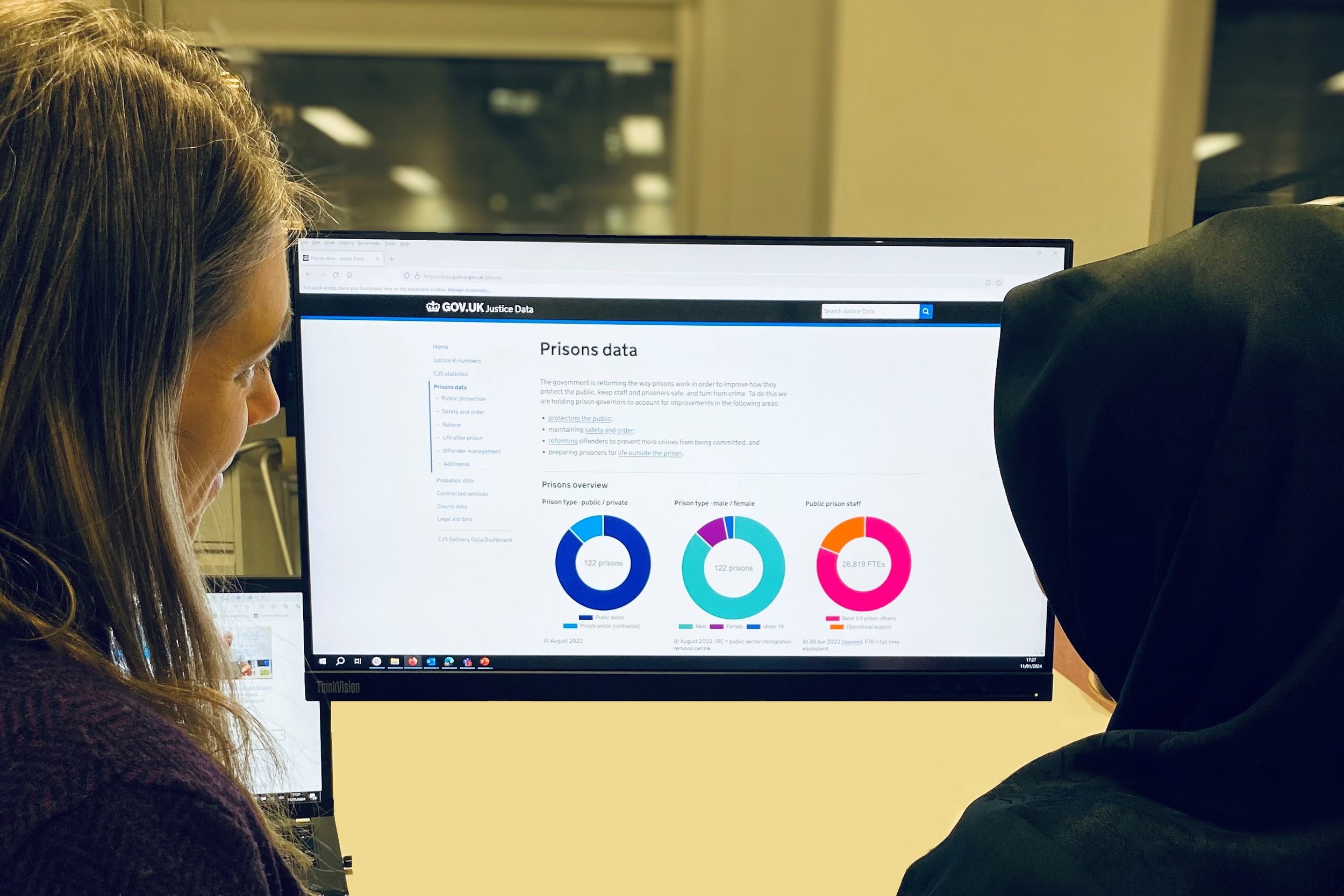Data Governance Interview Debbie Carless
/As part of my job I come across so many people that I know have great Data Governance stories to tell and Debbie is one of those people.
Like many of us Debbie has had a winding career, often steered by opportunities that she hadn’t planned to take. Debbie has worked in maintenance and estate management mostly, in all types of business, from a Formula 1 engine manufacturer (where everything needed doing yesterday) to education providers (where everything seems to take ages). She likes sorting things out, and implementing things, such as software or management systems to make sense of chaos.
Debbie describes herself as a very social person and enjoys working with people., she cares about any problems colleagues experience and has a natural leaning towards wanting to help.
On top of that, Debbie is also a musician, which lends itself to wanting order, structure, systems, and rules.
This all adds up to make Debbie very good at her most recent role of Data Governance Manager for Solent University, so I was thrilled when she agreed to be interviewed to share her insights with you:
How long have you been working in Data Governance?
I will have been the Data Governance Manager at Solent University for three years in June 2024. This is my first Data Governance Role. However, I’ve always worked with data. I was a consultant for a software company for 6 years and set systems up for our customers from scratch. I would now say I was a data steward and data producer, always looking for efficiencies (importing or integrating data) and methods to ensure data quality. I liked to be confident that the work I did was accurate, as best as I could tell. So, I think without knowing it, I’ve always worked in Data Governance to some extent!
Some people view Data Governance as an unusual career choice, would you mind sharing how you got into this area of work?
I was inspired to apply to be Data Governance Manager because I wanted to be in the middle of a huge transformation planned at Solent University. A complex project started in 2020 to change our student records system which included other projects to change all of the system integrations, reports and to implement data governance.
I had been working in Estates and Facilities at Solent University and I read the vacancy for Data Governance Manager with great interest, and was excited at the potential of being at the heart of making the changes needed to deliver the projects. I was concerned that the role would be quite technical (which I am not) but the line manager assured me that it wasn’t. She also confirmed that it was more important to be able to talk in a non-technical way to people at all levels and that someone who was happy to engage with our staff was more important. I am a people person, so I felt I fit the bill and applied.
What characteristics do you have that make you successful at Data Governance and why?
I never forgot how I felt when I was invited to my first data governance meeting, about 6 months before I was appointed Data Governance Manager. The data governance project, which was aligned to the new student records system project, had already started with the support of Alex Leigh of the Leigh Partnership and yourself Nicola. My first thought was “now what are you going to tell me I can’t do?!” I never forgot that feeling, almost groaning at the prospect!
When I took up the post I genuinely didn’t want people to groan if I asked them to work on data governance with me. I like people, so I enjoyed finding data owners, chatting to them about their data problems, mapping their data and working with them to get to the bottom of their issues. I set out with some promises, like “I will never take more than an hour each time we meet” and “I’ll do all the typing” and “I promise to make it fun”. Much of this was completed on Microsoft Teams thanks to a pandemic.
However, I much prefer working with people in person. So, one year into my new role I invited Alex and his colleague Rav Ubhi-Adams to the campus and setup two days of topical workshops that people could pick and mix to attend. I was greatly encouraged that many my colleagues participated, and we gained a great deal from the sessions. This format was working, so I decide to hold a monthly on campus workshop, picking topics based on questions I needed to answer. Topics included “What is a student?”, “How can we get more data savvy?” and “What are your data barriers?”. Colleagues attended from across the university community, so I trusted this process to help identify what I needed to work on as well as getting agreement of terms in our data glossary.
Eventually, I developed a brand. I chose “Data Matters” for anything about data governance, because it covers all data matters and it does matter and it doesn’t make people run a mile! Inspired by suggestions from other data governance professionals I created an emoji of myself and used it in my quarterly newsletter in a Sway.
Finally, when people ask me what I do, I tell them I am to data what a conductor is to an orchestra. A conductor pulls the orchestra together; don’t play any instruments; rehearse each section in turn, sort out the tricky bits, then pull the full group together to work on the performance. A data governance manager pulls the data stewards together; doesn’t edit any of the data; does workshops to build understanding and shares that through engaging and fun channels to change the culture.
Are there any particular books or resources that you would recommend as useful support for those starting out in Data Governance?
Alex Leigh! He is so knowledgeable and encouraging. Without Alex, I’d be nowhere!
Your Introduction to Data Governance training was a catalyst to building my confidence. You helped me realise that a data governance framework is a management system for data. That helped structure my thoughts in the early stages of our implementation.
Your YouTube videos and blogs. I use these quite a bit in my workshops. You explain things so clearly – “How to write a data definition” and “Data Literacy or Data Fluency” are my regular go tos.
My colleagues. It is important that you talk to data stewards and data owners, especially if you don’t understand something. There is a mountain of knowledge in your workplace that you can tap for free!
What is the biggest challenge you have ever faced in a Data Governance implementation?
I have implemented data governance just once. The biggest challenge for me what to learn what I was supposed to be doing. This was complex and although I was confident I could set up a management system, the hardest part of all was deciding what that should include and how we would do it. Part of that involved getting our newly formed Data Executive Board to understand it’s purpose. At first I expected the board to tell me what they wanted, but it was for me to set the direction, develop the understanding and set our goals. I actually lost sleep over this. I was given my biggest ever professional insult (“show some leadership”) and nearly chucked in the towel but with some excellent coaching from two inspirational leaders I got a grip! I think the biggest lightbulb moment was when I realised “I own this”. It was up to me to find what would work for us and do it!
Is there a company or industry you would particularly like to help implement Data Governance for and why?
I don’t expect to move from Solent University before I retire but I would like to mentor other data governance managers in the future. If I was to pick an industry it would of course be higher education, but I also know the services sector and the Formula 1 racing business quite well so I would be more than happy to revisit these.
What single piece of advice would you give someone just starting out in Data Governance?
If you are in Higher Education talk to Alex Leigh about supporting you. Also, I recommend attending your Introduction to Data Governance course. That was so valuable to me, it added some structure to the mountain I was about to climb. And finally, embrace the business sector networks available to you, such as the Higher Education Data Governance Network, where you will meet people with experience and expertise that are very happy to share.
Finally, I wondered if you could share a memorable data governance experience?
I’ve recently sent out our latest data maturity assessment survey. I was reviewing this around the time I was dealing with some data quality issues in our student records system (yes, the new one – it went live in August 2023). The survey is split into sections and one of them is called “Data is managed”. I had to look twice, because I though it said “Data is damaged” which made me laugh out loud. I shared my joke with Rav Ubhi-Adams, who was setting up the survey for me on behalf of Alex Leigh. She said, “I have a feeling that a lot of people will connect with that language!!” So, I thought I’d share it here. Data is never perfect, but in our experience having a Data Governance manager that can facilitate resolving the issues elevates our chances of trusting it. The survey will tell me if it’s working!
















